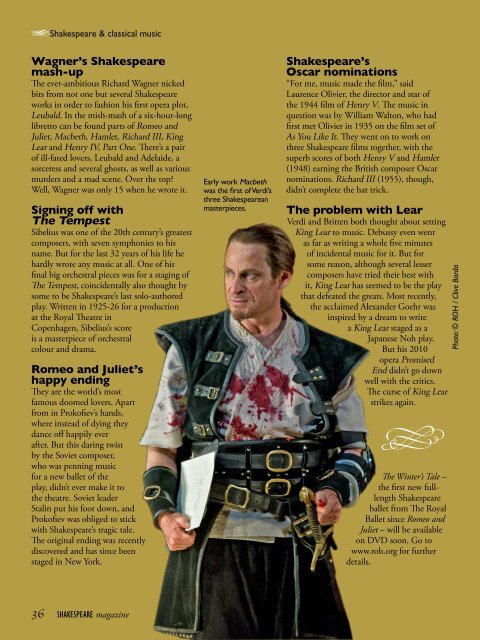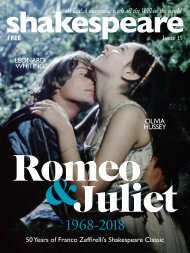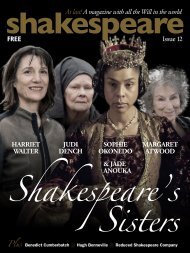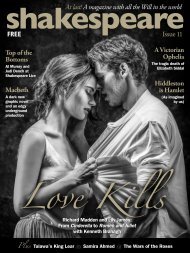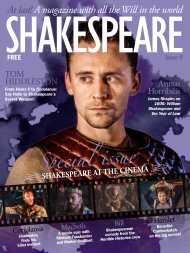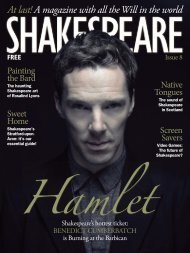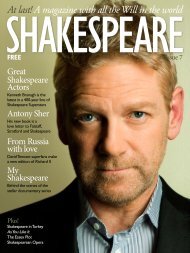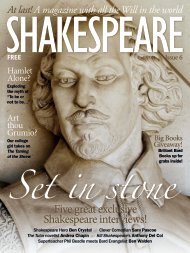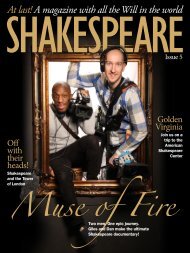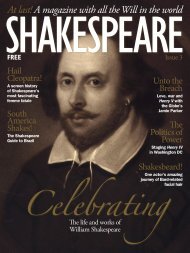Shakespeare Magazine 02
The second issue of Shakespeare Magazine features a wealth of wonders from the world of William Shakespeare. Highlights include David Tennant fans sharing their Shakespeare, Hamlet restaged with toys, Shakespeare in Sydney, and the enduring romance of Shakespeare and classical music. Plus much more!
The second issue of Shakespeare Magazine features a wealth of wonders from the world of William Shakespeare. Highlights include David Tennant fans sharing their Shakespeare, Hamlet restaged with toys, Shakespeare in Sydney, and the enduring romance of Shakespeare and classical music. Plus much more!
You also want an ePaper? Increase the reach of your titles
YUMPU automatically turns print PDFs into web optimized ePapers that Google loves.
<strong>Shakespeare</strong> & classical music<br />
Early<br />
Wagner’s <strong>Shakespeare</strong><br />
mash-up<br />
The ever-ambitious Richard Wagner nicked<br />
bits from not one but several <strong>Shakespeare</strong><br />
works in order to fashion his first opera plot,<br />
Leubald. In the mish-mash of a six-hour-long<br />
libretto can be found parts of Romeo and<br />
Juliet, Macbeth, Hamlet, Richard III, King<br />
Lear and Henry IV, Part One. There’s a pair<br />
of ill-fated lovers, Leubald and Adelaide, a<br />
sorceress and several ghosts, as well as various<br />
murders and a mad scene. Over the top?<br />
Well, Wagner was only 15 when he wrote it.<br />
Signing off with<br />
The Tempest<br />
Sibelius was one of the 20th century’s greatest<br />
composers, with seven symphonies to his<br />
name. But for the last 32 years of his life he<br />
hardly wrote any music at all. One of his<br />
final big orchestral pieces was for a staging of<br />
The Tempest, coincidentally also thought by<br />
some to be <strong>Shakespeare</strong>’s last solo-authored<br />
play. Written in 1925-26 for a production<br />
at the Royal Theatre in<br />
Copenhagen, Sibelius’s score<br />
is a masterpiece of orchestral<br />
colour and drama.<br />
Romeo and Juliet’s<br />
happy ending<br />
They are the world’s most<br />
famous doomed lovers. Apart<br />
from in Prokofiev’s hands,<br />
where instead of dying they<br />
dance off happily ever<br />
after. But this daring twist<br />
by the Soviet composer,<br />
who was penning music<br />
for a new ballet of the<br />
play, didn’t ever make it to<br />
the theatre. Soviet leader<br />
Stalin put his foot down, and<br />
Prokofiev was obliged to stick<br />
with <strong>Shakespeare</strong>’s tragic tale.<br />
The original ending was recently<br />
discovered and has since been<br />
staged in New York.<br />
work Macbeth<br />
<br />
three <strong>Shakespeare</strong>an<br />
masterpieces.<br />
<strong>Shakespeare</strong>’s<br />
Oscar nominations<br />
“For me, music made the film,” said<br />
Laurence Olivier, the director and star of<br />
the 1944 film of Henry V. The music in<br />
question was by William Walton, who had<br />
first met Olivier in 1935 on the film set of<br />
As You Like It. They went on to work on<br />
three <strong>Shakespeare</strong> films together, with the<br />
superb scores of both Henry V and Hamlet<br />
(1948) earning the British composer Oscar<br />
nominations. Richard III (1955), though,<br />
didn’t complete the hat trick.<br />
The problem with Lear<br />
Verdi and Britten both thought about setting<br />
King Lear to music. Debussy even went<br />
as far as writing a whole five minutes<br />
of incidental music for it. But for<br />
some reason, although several lesser<br />
composers have tried their best with<br />
it, King Lear has seemed to be the play<br />
that defeated the greats. Most recently,<br />
the acclaimed Alexander Goehr was<br />
inspired by a dream to write<br />
a King Lear staged as a<br />
Japanese Noh play.<br />
But his 2010<br />
opera Promised<br />
End didn’t go down<br />
well with the critics.<br />
The curse of King Lear<br />
strikes again.<br />
<br />
The Winter’s Tale –<br />
the first new fulllength<br />
<strong>Shakespeare</strong><br />
ballet from The Royal<br />
Ballet since Romeo and<br />
Juliet – will be available<br />
on DVD soon. Go to<br />
www.roh.org for further<br />
details.<br />
Photo: © ROH / Clive Barda<br />
36 SHAKESPEARE magazine


